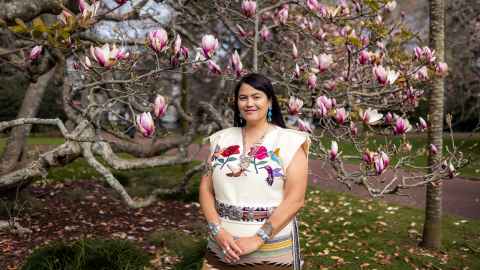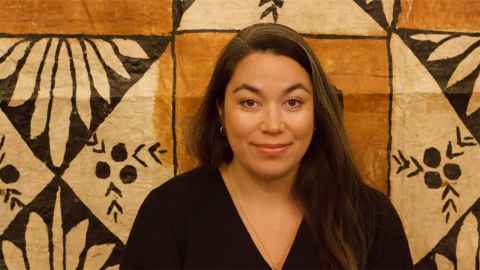Emerging researchers get HRC grants
24 May 2024
Twelve emerging researchers from Waipapa Taumata Rau, University of Auckland have won HRC First Grants in 2024.

Innovative projects across physical, community and mental health have earned a number of Waipapa Taumata Rau, University of Auckland early-career researchers Health Research Council of New Zealand (HRC) First Grants in 2024.
These HRC grants are intended to support emerging talent to develop independent health research careers.

Dr Priyanka Agarwal, Faculty of Medical and Health Sciences
Development of a topical treatment for management of chronic wounds
36 months, $ 400,000
Chronic wounds are non-healing wounds in which the physiological healing process is impaired, often in parallel with an underlying disease or condition, for example, peripheral vascular disorders, diabetes and obesity.
This is one of the most common, yet underrated, global concerns, often leading to significant morbidity, amputation and even death.
In New Zealand, chronic wounds are one of the most common causes of medical incapacity with their incidence and consequent amputation and disability being significantly higher in the Māori.
Persistent inflammation is the hallmark feature of chronic wounds; however, clinical translation of anti-inflammatory therapeutics has been limited by the difficulty in delivering therapeutically relevant drug concentrations to the wound site.
This project aims to enable clinical translation of New Zealand-invented therapeutics to improve to improve wound care and foster health equity.

Dr Recep Avci, Auckland Bioengineering Institute
Electromagnetic tracking system for the gut, 36 months, $400,000
The journey of food through the gut is long and extremely complex.
When gut function is impaired, nutritional support and diagnostic interventions often require the insertion of catheters, which is usually performed without any visual guidance.
This entails many risks including death arising from misplacement.
Catheter placement can be subsequently confirmed using X-ray but it exposes patients and staff to radiation, increases the overall healthcare cost, and delays patient care.
We propose a 'GPS system' for the gut to guide and confirm catheter placement in real-time.
The system will harness state-of-art sensor technology for efficient, reliable, and accurate confirmation enhancing the safety of procedures.
This new technology will be low-cost and easy-to-use allowing procedures to be performed at the bedside and will be easily deployed in rural locations without needing specialised healthcare professionals.
Hence, this research will help address inequities in healthcare provision by developing a technology with wide application.

Dr Christopher Hedges, Faculty of Medical and Health Sciences
Understanding new targets for weight loss therapeutics, 36 months, $399,844
Obesity is a growing global health concern, and obesity/obesity-related health conditions (such as cardiovascular disease/type 2 diabetes) decrease quality of life, and increase mortality.
Current estimates are that one in three adult New Zealanders are obese, with a further one in three overweight.
Current efforts to decrease rates of obesity are not working, as the proportion of people classed as obese continues to rise.
There is an urgent need for effective therapeutics that can help decrease and/or control bodyweight.
We have data showing that inhibiting insulin signalling in obese mice results in significant weight loss, occurring largely through the loss of body fat.
However, this is associated with an increase in blood sugar levels.
With this research, I am interested in understanding how this weight loss is occurring, and whether we can manage the associated hyperglycaemia.
This could uncover new targets and/or strategies for more effective weight -anagement therapies.

Dr Sanjay Marasini, Faculty of Medical and Health Sciences
Light assisted management of fungal keratitis, 24 months, $ 400,000
Non-pharmacological, light-based anti-infective approaches have the potential to kill a wide range of microorganisms, irrespective of antimicrobial resistance status.
Using Ultraviolet C light (200-280 nm), microbial cells can be rapidly killed through DNA damage.
The method effectively manages all infections caused by bacteria, fungi, and viruses.
I have previously shown that low-intensity UVC kills bacteria irrespective of the antibiotic-resistance profile, as well as yeast, fungi, and multiple pathogens grown together as in a polymicrobial infection and is safe for the cornea.
Therefore, it is hypothesised that UVC will rapidly cure yeast corneal infection without affecting host cells while killing other bacterial copathogens.
Data obtained from this project, when combined with previously published data from my research, will lay the foundations for developing a novel, light-based, cost-effective empiric treatment for corneal infections.

Dr Mohammed Mohammed, Faculty of Medical and Health Sciences
AIM-Safer: Automated Intelligence for Safer Medication use in older adults , 36 months, $399,990
By 2028, NZ's ageing population will reach one million, with one-third taking five or more medicines (called polypharmacy).
Polypharmacy increases the risk falls, injuries and hospitalisation. In addition, inequities in quality medicines use cause a three-fold risk of not getting the necessary medicines and a 1.5-fold hospitalisation rates in older Māori.
There is currently no efficient method in New Zealand to quantify spectrum of medicines-related harm that older adults face including having inappropriately prescribed polypharmacy or not the necessary medicines prescribed, which disproportionately affect older Māori.
This project aims to develop New Zealand’s first digital tool to guide safer use of medicines in older adults.
The tool will use algorithms to systematically gather and intelligently analyse information and produce customised patient specific summary to generate recommendations that align with the patient’s goals of care.
This helps to provide personalised (de)prescribing, reduce inequities in medicines use and healthcare costs associated with medicines-related harm.

Dr Mariana Muelbert, Liggins Institute
Antenatal corticosteroids effect on Lactation and Maternal-infant health (ALMA), 36 months, $TBC
Women who birth by Caesarean section are more likely to experience issues with breastfeeding and their babies are at greater risk of breathing difficulties after birth.
Antenatal corticosteroid treatment is highly effective at reducing breathing difficulties in babies born preterm.
Its use is being explored in other situations where there is an increased chance of breathing problems for babies after birth, such as following planned Caesarean section.
Evidence of benefit in these situations is less clear.
Cortisol and cortisone are hormones involved in lactation and in regulation of behaviour, sleep and blood sugar levels.
However, it is unclear whether antenatal corticosteroid treatment can impact lactation and maternal and infant cortisol regulation.
This research will explore whether antenatal corticosteroid treatment for women undergoing planned Caesarean section may impact breastmilk composition and regulation of cortisol after birth.
These findings will contribute to advance our knowledge of health outcomes following antenatal corticosteroid treatment, improving healthcare delivery.

Dr Amelia Power, Faculty of Medical and Health Sciences
Balancing heart energetics: Diabetes, Statins and Coenzyme Q10 , 36 months, $ 395,081
Diabetes increases the risk of heart disease and therefore diabetics are commonly prescribed lipid-lowering drugs (statins) to help reduce this risk.
The heart requires constant energy to continuously beat throughout life.
Energy supply to the heart is impaired in diabetes, meaning the muscle does not beat as effectively.
Mitochondria are the main source of energy for heart cells, with coenzyme Q10 (CoQ10) an essential component of the mitochondrial energy producing system.
CoQ10 is mainly produced within the body through a pathway that is interrupted by statins, yet it is not known if CoQ10 is deficient in diabetic hearts.
We will quantify CoQ10 in human heart tissue from patients with and without type-2 diabetes, and the impact of statins.
Furthermore, we will establish a system to keep human heart tissue alive and beating, enabling us to test whether prolonged supplementation of CoQ10 can improve mitochondrial energy supply in the diabetic heart.

Dr Vartika Sharma, Faculty of Medical and Health Sciences
Co-creating a parental resource with migrants to support youth mental health, 36 months, $ 399,825
In 2018, 17 percent of New Zealand’s population consisted of individuals identifying with Asian, Middle Eastern, Latin American, or African ethnicities with more than three-quarters of them born overseas.
Ethnic minority youth in New Zealand report significant rates of poor mental health with risk factors related to experiences of racism, colourism, poor body image, and a lack of belonging.
Further, mental health is often highly stigmatised in these communities, leading to poor help-seeking behaviours.
Thus, many migrant families find it challenging to support their ethnic-minority youth as they navigate their lives in New Zealand.
Creating a family environment that acknowledges the lived experiences of ethnic-minority youth and provides support to mitigate the mental health risks is a crucial step in addressing the mental health crisis in New Zealand.
In this study, a resource co-created with migrants will offer parents relevant and reliable means of support for ethnic minority youth as they navigate complex and challenging life circumstances.

Dr Marie-Claire Smith, Faculty of Science
Design of a rehabilitation model for cardiovascular health after stroke, 36 months, $ 398,144
After stroke, regular moderate to high intensity exercise is important to prevent another stroke and improve function. However, this is seldom put into practice due to competing priorities for therapist time and patient and therapist concerns around safety.
The risk factors for stroke are similar to those following a cardiac event, with both occurring due to poor cardiovascular health.
Cardiac rehabilitation programmes are standard care after a cardiac event, and provide a safe, supervised environment to support return to exercise, management of lifestyle factors and self-efficacy to manage their condition independently.
There is no equivalent programme for people with stroke.
This study will explore current cardiovascular training post-stroke in Te Whatu Ora, and use co-design with clinicians, people with stroke and whanau to develop and test a community-based interdisciplinary service model for post-stroke cardiovascular training.

Dr Sandra Yellowhorse, honorary academic, Faculty of Education and Social Work
Cultivating wellbeing by advancing indigenous perspectives of autism, 36 months, $ 399,866
This research project explores Māori, Pacific, and International Indigenous diasporic perspectives of autism and disability.
We frame these identities as Tangata Whenua, Tangata Moana, and Tangata Tiriti perspectives.
This research responds to the lack of wider cultural perspectives of disability and autism.
Disability and autism are often understood solely as diagnostic traits.
This understanding permeates all sectors that provide service to disabled people.
However, there are wider cultural understandings of disability that move beyond diagnostic criteria.
These perspectives are required to effectively reach and cater to the diverse disabled community within Aotearoa to account for the array of histories, customs, or ancestral stories of disability within Māori, Pacific, and Indigenous diasporic communities.
These perspectives are needed to cultivate the professional expertise, engagement and effective planning in the health and disability sectors to cater to the diverse populations in Aotearoa.

Dr Sue Adams, Faculty of Medical and Health Sciences
Nurse practitioners: Re-prioritising primary care delivery to promote equity, 30 months, $ 399,766
Aotearoa New Zealand is faced with persisting issues of inequitable healthcare access and outcomes, the need for increased prevention of disease and promotion of health, and a shortage of general practitioners.
There are now over 700 nurse practitioners in Aotearoa.
Te Whatu Ora, in their Health Workforce Plan 2023/24, have committed to increase nurse practitioner training places (to 100 in 2024) as well as the representation of Māori, and Pasifika.
It is critical that we progress research on the integration, work and activities of nurse practitioners if we are to optimise this highly relevant and valuable workforce in the primary healthcare sector.
This research will provide answers as to how nurse practitioners enhance and transform healthcare delivery to meet local health need, improve access, and advance health equity, as well as developing indicators to measure nurse practitioners' contributions.

Dr Sarah Kapeli, Faculty of Science
Pasifikmetrics: A psychometric measure of Pasifika mental health literacy, 36 months, $ 399,977
Positive links have been demonstrated between mental health literacy and mental health and well-being outcomes.
Evidence also suggests that measuring mental health literacy is crucial to promoting mental healthcare, particularly for populations more vulnerable to mental health concerns.
This is important given the overrepresentation of Pacific peoples in mental health statistics.
Therefore, this project aims to develop a culturally appropriate and relevant psychometric Pasifika mental health literacy measurement tool in the context of Aotearoa New Zealand.
A Pasifika mental health literacy measure has the potential to offer a quick and meaningful way to provide insight into the mental health beliefs, knowledge, attitudes, and help-seeking behaviours of Pacific peoples.
The Pacific mental health literacy measurement tool can be used to support Pacific mental health by providing a way to regularly monitor the mental health literacy of our communities and by generating an evidence base to inform areas such as policy, health promotion, education, and the intervention and prevention space.
Media contact
FMHS media adviser Jodi Yeats
M: 027 202 6372
E: jodi.yeats@auckland.ac.nz